Common Fall Plants that Cause Allergies
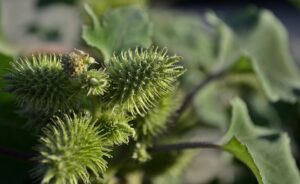
Fall allergies are common in the U S, in fact, it’s estimated that “50 thousand people have fall allergies”, it’s said that” one in five” has allergies issues. It’s believed that “allergies are the 6th leading cause of chronic illness”. There are many culprits that are responsible for allergies some of which include dust, mold, dust mites, certain foods such as peanuts, milk, eggs, shellfish, some fruits and vegetables, soy, wheat, etc...
But among the most common are plant pollen, the presence of certain plants has been known to cause allergies even during the fall months. In this article, we will be taking a closer look at some of these plants that may be a part of your garden and landscape and what to do if they are discovered. With that said we turn our attention to plants that cause fall allergies.
What are Fall Allergy Symptoms?
- Nasal congestion
- Runny nose
- Headaches
- Sneezing
- Rashes or hives on the skin
- Itchy eyes
- Scratchy throat
- In severe cases, trouble breathing is an emergency that involves medical care immediately.
- Aggravated asthma symptoms that include coughing and wheezing
5 Fall Plants that Cause Allergies
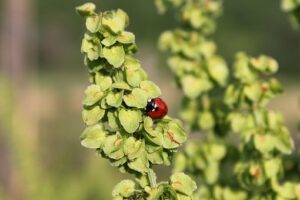
1. Curly Dock- Curly dock is a perennial weed that is grown as a herb in some gardens, elongated stalks branches from the top, these stalks produce flowers in clusters that turn reddish-brown and seeds at maturity. This perennial herb produces rosette basal leaves that are lanched-shaped and curly.
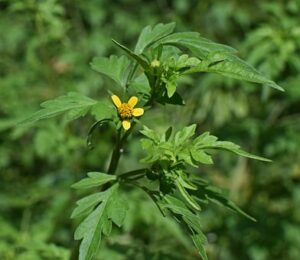
2. Ragweed- Ragweed grows in the South, North, and the Midwest, this weed is known to cause the most allergy symptoms during the fall months, contributing to 75% of hayfever issues. The greenish-yellow flowers that are produced are said to produce up to 1 billion pollen grains, the winds can cause these grains to travel up to 700 miles.
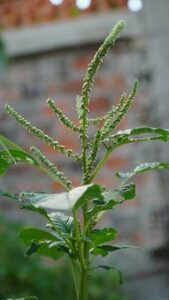
3. Pigweed– This weed that’s an annual has diamond-shaped leaves oppositely arranged, with long tall stems. At the top of the plant are small green flowers that are packed in clusters of spiky flowers. From the leaf axil below small spikes can be seen sprouting.
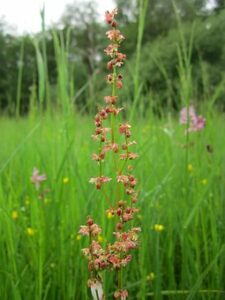
4. Sheep’s Sorrel- Sheep’s sorrel is a perennial weed that produces a clump of green arrowhead-shaped leaves, tiny red or yellow flowers appear on erect stems that branch near the top.
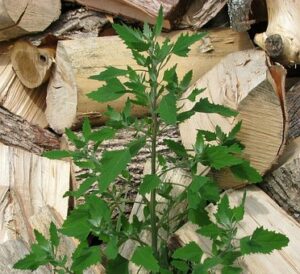
5. Lambsquarter- This annual weed produces broad toothy-edged basal leaves that are triangular or diamond-shaped, which have the appearance of a geese webbed feet. The coating of this annual weed is white and dusty, and the leaves that are found near the top of the flower stalks are elongated. smooth and narrow. The seed pods and the flowers have the appearance of greenish-white balls, which are dense and packed in panicles at the tips of the main branches and the stems.
These are just a few of the many plants that contribute to allergies, know what you’re planting or what’s been grown in your garden along with signs or symptoms that may trigger allergies.
And Allergie Free Enviorment
Let’s do all that we can by seeking to remove plants and other agents that are responsible for allergies, while it may not be a simple task it’s possible to bring control that can lessen the chance of the onset of allergies.
A Bonus Point Just for You
Plants that produce yellow flowers produce heavy pollen that can encourage the onset of allergies.
The final word on plants that cause fall allergies
During this time of the year even the spring and the summer months we should be aware at all times of plants that are responsible for allergies. Let us do whatever we can to lessen the chance of having to deal with this issue.
About the author
Norman loves being in the garden, both at home and for his job....
he is 'Natures Little helper' being outdoors, growing his vegetables and flowers from an early age.
Now having spent over 22 years in the profession he want to give some of his knowledge to others...
his vast array of hints and tips you will find scattered over this site will help you no end growing plants in your garden.

Your post on plants that cause fall allergies was very helpful in me making sure I do not have plants near me as I struggle with allergies during each season. Bad sinus infections are the worse, they make you feel miserable even when you take over counter medications. I am going to share your information with my media followers.
Hello, I am so happy that I could help and so sorry that you have this issue, I believe that as long as we educate ourselves about allergies will can have better control over how to manage it. All the best to you and have a good day!